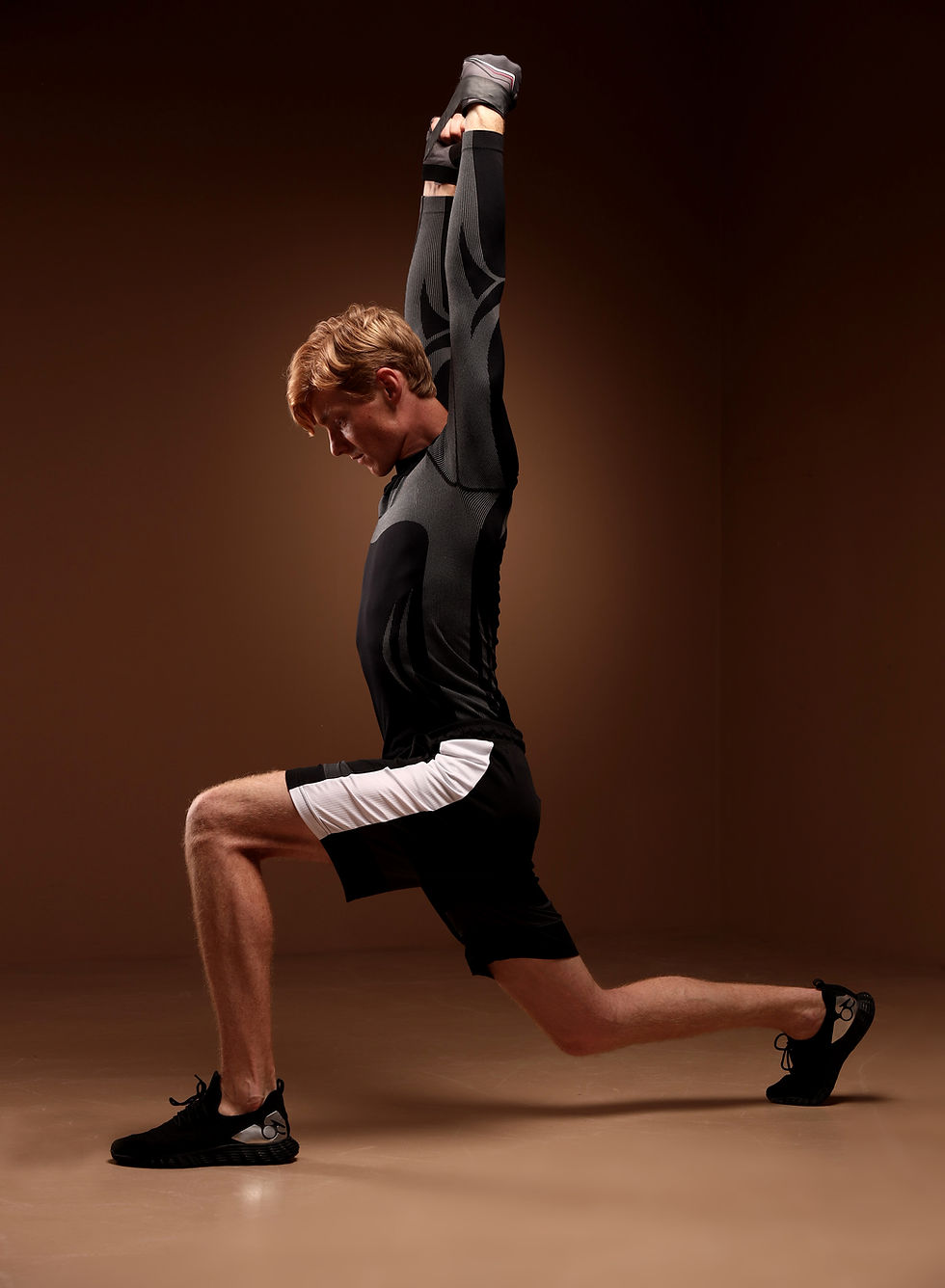The Science of Mindfulness: How Mental Training Enhances Distance Running Performance
- Austin Tobelmann

- Jul 2, 2025
- 6 min read
Updated: Nov 21, 2025
Enhancing Endurance Through a Focused Mind
In the world of distance running, the difference between a personal record and falling short often comes down to mental fortitude. While runners invest countless hours perfecting their physical training, an emerging body of research suggests that mindfulness practices may offer a powerful edge. Far from being just a relaxation technique, mindfulness is proving to be a scientifically backed tool for improving both psychological resilience and physiological performance in endurance athletes.
Understanding Mindfulness in Athletic Context
Mindfulness is the practice of maintaining heightened awareness and presence in the current moment. It involves observing thoughts, emotions, and physical sensations without judgment, while cultivating the ability to refocus attention when the mind wanders. For distance runners, this translates into acute awareness of breathing patterns, running form, mental state, and competitive positioning. Unlike passive meditation, mindfulness in running is an active process that can reduce distractions and enhance both physical and mental efficiency during training and competition.
The Evidence: Mindfulness is Trainable and Measurable
One of the most compelling aspects of mindfulness research is that it demonstrates both correlation and causation. Studies have found that higher mindfulness scores correlate with superior running performances, but more importantly, these scores improve with consistent practice. This means mindfulness isn't an innate trait that some athletes possess and others don't—it's a skill that can be developed through training.
Research has identified specific areas where mindfulness practice shows measurable improvements:
Awareness
Non-judgment
Refocusing ability
Concentration
Coping with adversity
Performance under pressure
Coachability
Motivation
Confidence
These improvements aren't just subjective feelings; they're quantifiable changes that translate directly into better athletic performance.

Psychological Benefits: Training the Runner's Mind
Maintaining Focus During the Grind
Distance running presents unique mental challenges. Long runs can trigger boredom and mental fatigue, while intense workouts and races demand the ability to endure significant discomfort. Mindfulness training equips runners to stay present, focusing on each step, each breath, and the rhythm of their movement. Rather than allowing negative thoughts to spiral, mindful runners learn to recognize these thoughts and replace them with constructive mantras or simply return their attention to the present moment.
This heightened concentration prevents the mental drift that can sabotage performance and reduces anxiety about outcomes. Consequently, many mindfulness researchers recommend running without music, podcasts, or other distractions, allowing athletes to be fully immersed in each moment of their training.
Managing Stress and Performance Anxiety
Pre-race jitters and performance anxiety are universal experiences among competitive runners. Mindfulness techniques—including controlled breathing exercises, meditation, and visualization—help athletes transform nervous energy into productive focus. A study by Jaenes and colleagues published in Frontiers in Psychology demonstrated that psychological interventions, including mindfulness practices, effectively improved performance outcomes in amateur marathon runners. These stress management skills extend beyond competition, enhancing training quality and contributing to improved mental well-being in all areas of life.
Building Mental Resilience
Distance running inevitably tests the limits of mental endurance. Mindfulness helps runners acknowledge and accept discomfort as an inherent part of the process rather than something to resist or fear. This acceptance allows athletes to reframe racing as a challenge to embrace rather than a threat to avoid. Research published in the Journal of Sports Sciences found that mindfulness training reduced pain catastrophizing—the tendency to magnify pain sensations and feel helpless in response to them—which directly correlated with improved 800-meter race times. This resilience enables runners to push through difficult moments with greater ease and determination.

Physiological Benefits: The Mind-Body Connection
Optimizing Breathing Efficiency
Breath awareness forms a cornerstone of mindfulness practice, and for runners, mindful breathing can significantly improve oxygen efficiency. By ensuring muscles receive adequate oxygen during sustained efforts, runners can maintain performance over longer distances. Techniques such as diaphragmatic breathing (breathing deeply into both belly and chest) or rhythmic breathing (synchronizing breath with footstrike patterns) can reduce fatigue and enhance endurance. This conscious control of breathing patterns represents a direct physiological benefit that stems from mental training.
Altering Pain Perception
One of the most fascinating findings in mindfulness research is its effect on pain perception. By focusing on the present moment and reframing pain as simply sensation—rather than suffering—runners can prevent minor discomfort from becoming overwhelming. This doesn't mean ignoring injury signals, but rather developing a more nuanced relationship with the inevitable aches that accompany distance running. The ability to run through manageable discomfort while maintaining awareness can make a significant difference in performance outcomes.
Accelerating Recovery
Mindfulness practices extend beyond the run itself. Post-workout mindfulness techniques, such as body scans or meditative stretching, can promote faster recovery by helping muscles relax and potentially reducing inflammation. Athletes who incorporate these practices after training sessions often report feeling more refreshed and prepared for subsequent workouts, suggesting that mindfulness may optimize the critical recovery phase of training.

Practical Mindfulness Techniques for Runners
Body Scanning
This technique involves mentally scanning the body from head to toe, identifying areas of tension or discomfort, and consciously releasing muscle tightness. During a run, body scanning helps runners adjust their posture, stride mechanics, or breathing patterns to achieve optimal efficiency and prevent injury.
Mantras and Positive Affirmations
Repeating a meaningful phrase during challenging moments can sustain focus and motivation. Simple mantras like "one step at a time," "I am strong and steady," or "embrace the challenge" reinforce a positive mindset and counteract self-doubt. The key is choosing phrases that resonate personally and practicing them during training so they become automatic during competition.
Mindful Breathing Exercises
Coordinating breath patterns with running cadence creates a synchronized flow that minimizes wasted energy. For example, runners might inhale for three steps and exhale for two, establishing a rhythm that becomes meditative and efficient. Experimenting with different patterns during training helps identify what works best for individual physiology and effort levels.
Visualization
Mental rehearsal before races represents a powerful application of mindfulness. Visualizing specific race scenarios—maintaining form during challenging hills, executing a strong finishing kick, crossing the finish line with confidence—prepares the mind for success. Research suggests that visualization activates similar neural pathways as actual physical performance, making it an effective complement to physical training.

Scientific Evidence Supporting Mindfulness for Distance Running
In the last ten years, research has begun to show the benefits of mindfulness in athletic performance. It has been found that higher mindfulness scores correlate to better performances, and mindfulness scores improve with practice. The scores of mindfulness tests show that athletes who engage in mindfulness practice experience improved focus, reduced stress, and enhanced emotional regulation during competition. Similarly, mindfulness interventions lead to increased endurance and decreased perception of exertion among distance runners.
These findings demonstrate that mindfulness is not just a theoretical concept but a practical tool backed by science. Its effects on the brain, such as reducing activity in the amygdala (the brain’s stress center) and enhancing prefrontal cortex function (responsible for decision-making and focus), translate directly into improved running performance.

Integrating Mindfulness into Training
For runners eager to incorporate mindfulness into their routine, the process begins with small, intentional steps:
Start Simple: Begin with short mindfulness practices, such as focusing on your breath or observing your surroundings during warm-ups.
Consistency is Key: Incorporate mindfulness into each training session, gradually increasing its complexity and duration.
Seek Guidance: Apps like Headspace or Calm offer guided mindfulness exercises tailored to athletes.
Be Patient: Like physical training, mindfulness requires time to develop and produce results.
The Integration of Mind and Body
Mindfulness offers distance runners a unique advantage by uniting mental strength with physical capability to achieve peak performance. By developing enhanced focus, psychological resilience, and efficient recovery, mindfulness elevates running from a purely physical endeavor into a holistic experience that engages the full capacity of human potential.
Whether you're aiming to achieve a new personal record or simply seeking greater enjoyment and presence in your runs, the scientific evidence suggests that mindfulness training could be a key to unlocking your potential. The research is clear: the connection between mind and body isn't just philosophical—it's physiological, measurable, and trainable.
So the next time you lace up your running shoes, consider leaving the headphones at home. Tune into your breathing, notice the rhythm of your footstrike, feel the air moving in and out of your lungs, and observe the thoughts that arise without clinging to them. Run mindfully, and discover what your integrated mind and body can achieve together.
References
Bulğay, C., Tingaz, E. O., Bayraktar, I., & Çetin, E. (2020). Athletic performance and mindfulness in track and field athletes. Current Psychology, 41(7), 4482–4489. https://doi.org/10.1007/s12144-020-00967-y
Hagin, V., Gonzales, B. R., & Groslambert, A. (2015). Effects of cognitive stimulation with a self-modeling video on time to exhaustion while running at maximal aerobic velocity: A pilot study. Perceptual and Motor Skills, 120(2), 491–501. https://doi.org/10.2466/26.25.pms.120v18x5
Jaenes, J. C., Wilczyńska, D., Alarcón, D., Peñaloza, R., Casado, A., & Trujillo, M. (2021). The effectiveness of the psychological intervention in Amateur Male Marathon runners. Frontiers in Psychology, 12. https://doi.org/10.3389/fpsyg.2021.605130
Jones, M. I., & Parker, J. K. (2015). A conditional process model of the effect of mindfulness on 800-M personal best times through pain catastrophising. Journal of Sports Sciences, 34(12), 1132–1140. https://doi.org/10.1080/02640414.2015.1093648
Wu, C.-H., Nien, J.-T., Lin, C.-Y., Nien, Y.-H., Kuan, G., Wu, T.-Y., Ren, F.-F., & Chang, Y.-K. (2021). Relationship between mindfulness, psychological skills, and mental toughness in college athletes. International Journal of Environmental Research and Public Health, 18(13), 6802. https://doi.org/10.3390/ijerph18136802



Comments